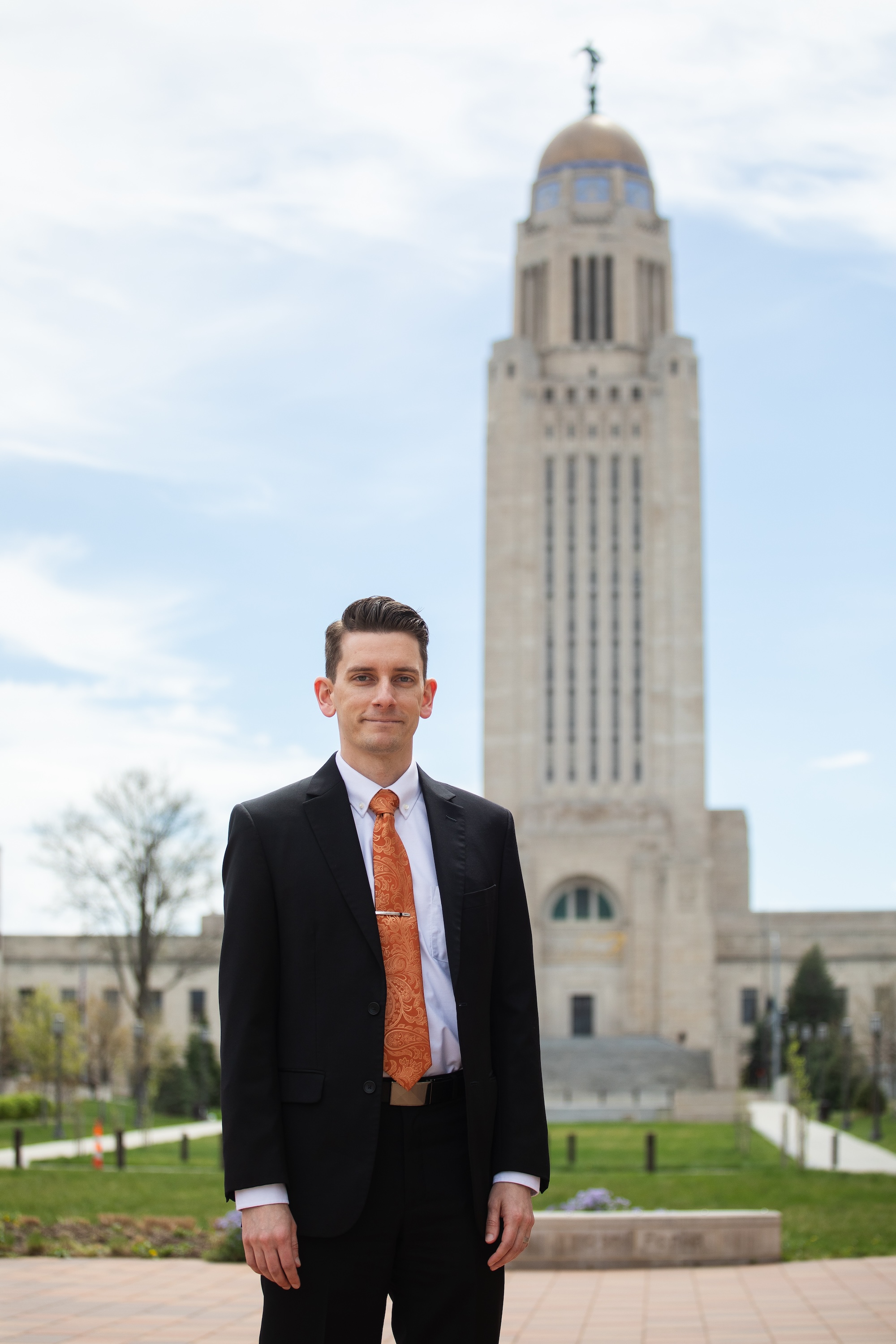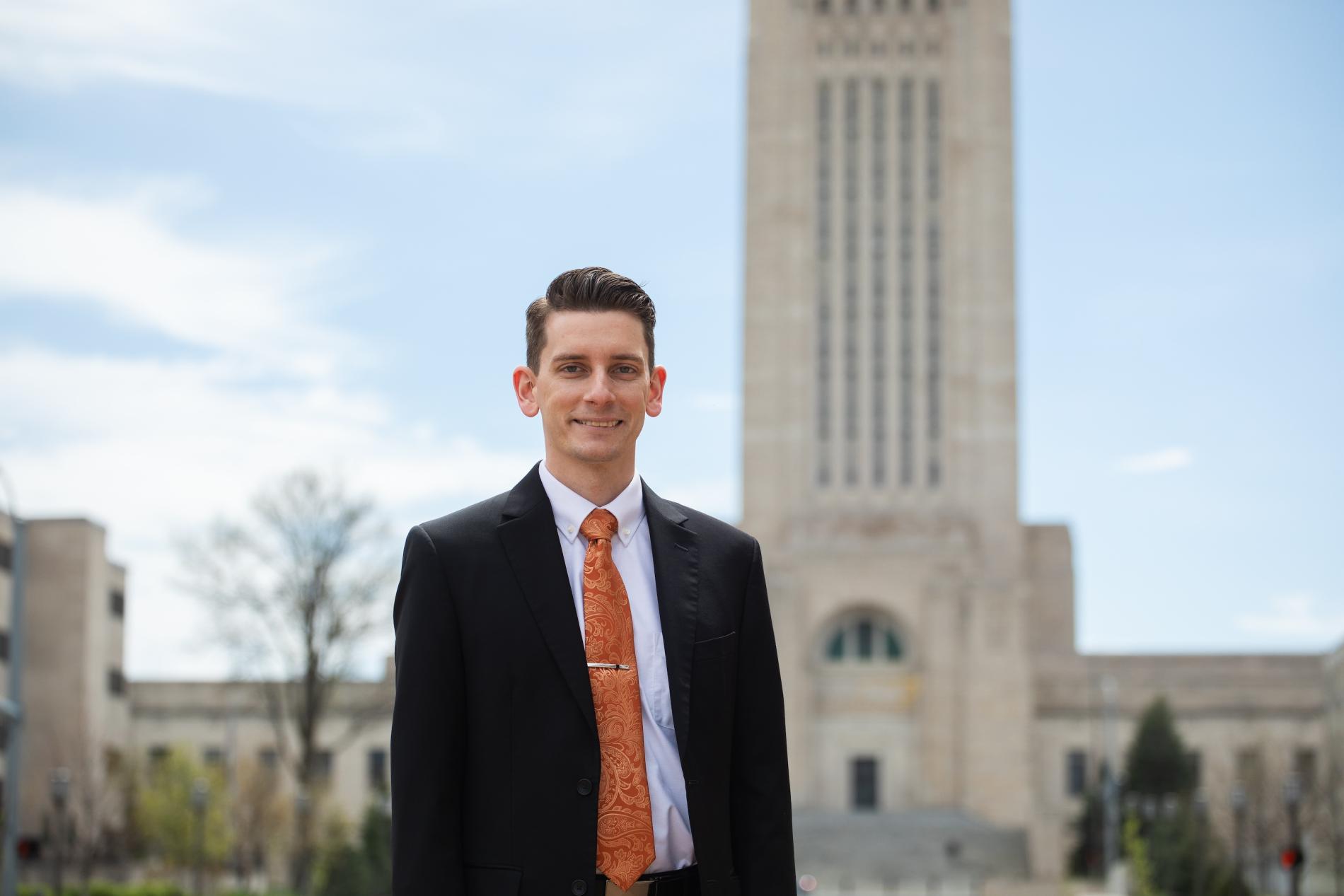Story and photos by Liz McCue
Zach Blackman ‘09 graduated from the University of Nebraska College of Law in 2012 sure that he was going to go into civil litigation, to represent clients in non-criminal matters. But in his first job at a small family law firm, he quickly realized that wasn’t the route he wanted to take.
Instead, his path led him to become first a deputy county attorney, then an assistant attorney general with the state.
And on May 24, he was sworn in as district court judge for Nebraska’s Sixth Judicial District. As an attorney, he said, you’re always taking on the role of advocate, whether your client is a person, the state of Nebraska, or society in general.
“And now as a judge, you have to set that aside completely. You’re not an advocate, you’re a neutral decision maker, you’re a mediator of the court,” he said.
It’s an incredible accomplishment, and a significant role that Blackman said his entire career, including his experiences at Doane, has prepared him for.

“It was everything”
Blackman went directly to law school after graduating from Doane, and dove right into his first job. But after a year, he realized civil litigation wasn’t his calling, and switched gears. He was hired as the deputy county attorney for Richardson County in Falls City, Nebraska, along with joining as an associate at a firm run by the county attorney.
His work covered nearly all of the prosecution for the county court, district court, juvenile court, and mental health board hearings. He served as the county coroner.
“It was everything,” he said. “It was very, very busy.”
The trial-by-fire experience gave him ample opportunities to be in the courtroom – 3-4 days a week – and to see a variety of cases that sometimes spilled over from neighboring states, Missouri and Kansas. He also had two great mentors, Julie and Rick Smith, who served as county and deputy county attorney in Johnson County (both are now judges.) They showed him the ropes of the position, and he shadowed them in court for just around two weeks.
”They were like, ‘I think you’ve got this,’ so they just threw me in and said, ‘our phone is always open.’ I was handling all the cases from there,” he said.
It was intimidating, but also served as the basis of his career. He enjoyed being in the courtroom. And although his job as an assistant attorney general was exciting and rewarding, working on high-profile cases that included homicides and corrupt public servants, his cases were fewer. He missed being in the courtroom.
“I can serve more people in this role,” he said, as a judge.
The sixth judicial district encompasses seven counties in northeast Nebraska along the Missouri River, with over 107,000 residents as of the 2020 census. As one of three judges for the district, Blackman’s position will focus on cases primarily in three of the counties.
Aiming for law school? Join forensics
Blackman had many experiences at Doane that have contributed to his success.
He learned how to be confident on stage and to work in harmony with others in the collegiate chorale, and concert and pep band. He gained leadership experience as the president of the Sertoma service club, an orientation leader, in Alpha Pi Epsilon fraternity and as a Doane Ambassador.
Blackman learned to mediate as a community adviser in Hansen Hall (“I absolutely loved living in Hansen,” he said) and as a member of the peer judicial board. He challenged himself academically as a member of Cardinal Key and the Honors Program.
And of course he competed in forensics, placing fifth nationally his senior year in communication analysis and making the All-American team.
”It’s very important as a trial lawyer,” he said.
His forensics events included extemporaneous and impromptu, both of which are limited prep (read more about the events in this 2023 article.) For extemp, competitors are given a half hour to prepare a seven minute speech about one of three topics, typically about domestic policy or foreign affairs. With impromptu, you receive a word, phrase or quote, and have up to seven minutes to prepare and present a speech.
“Half of what you do as a trial attorney is, you’re approached with something new, something you weren’t expecting and you have to use your knowledge from beforehand, the rules of evidence, and then you make up an argument and you argue it,” Blackman said. “That’s going to be the vast majority of what a district court judge does, especially during trials. You’re listening to the evidence and you’re making a determination based on the rules of evidence as they’re coming in.”
Make the most of opportunities and connections
While at Doane, Blackman took advantage of every opportunity he could – and he recommends current and future students do the same. He majored in political and social sciences with minors in history and economics, but, “to get into law school, you just need a degree,” he said.
It all depends on the area you want to go into – there are emphases in law for medicine, environmental justice, contracts, communications, children and families, divorce, etc. You might want accounting or business classes, he said, if you plan to open your own firm.
That’s an advantage of Doane’s liberal arts core, which emphasizes interdisciplinary education. Your major might be political science, but your classes will teach you about literature, science, public speaking, mathematics, along with skills in critical thinking, leadership and communication.
“Once you go into law school, it gets very regimented. You’ve got three years and you’ve got a core schedule you have to follow,” he said.
There isn’t that same opportunity to take “off-the-wall” classes in law school, he said. But at Doane, he was able to take courses outside of his majors and minors that allowed him to explore new interests and expand his worldview. He took psychology and sociology courses that have been beneficial to his career, for example. During his senior year interterm, he traveled to England and Scotland.
He took several other interterm classes that did fall under more of the “off-the-wall” definition, too — a ghost hunting course, and “Politics and Film” taught by his adviser, Dr. Tim Hill, professor of political science. But the range of his education, ghost hunting and all, has served him well.
“The broad base that Doane gave me is going to be really helpful,” he said, as a district court judge.
The connections he made at Doane have also carried him through his career, with support, friendship and mentorship. He remains close with Anne Golden Ziola ’04 ’10A, director of human resources and Blackman’s forensics coach while he was at Doane, and with Brent Friedeman ’09 and Anne DeLuca ’11, both forensics teammates and friends. Hill has written several letters of recommendation throughout his career, including when Blackman submitted his application for the Sixth Judicial District, and attended the May 24 swearing-in ceremony.
Those connections are incredibly valuable, he said.
“I am very thankful for Doane,” Blackman said.

